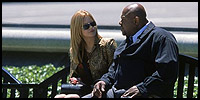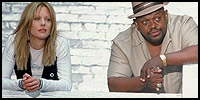
 |
|
Against The Ropes (2004) Cast: Meg Ryan, Omar Epps, Charles S. Dutton, Tony Shalhoub, Tim Daly, Kerry Washington, Joe Cortese, Holt McCallany, Tory Kittles, Skye McCole Bartusiak, Sean Bell 2004 – 111 minutes Rated: Reviewed by Dustin Putman, February 20, 2004.  Based on the true story of Jackie Kallen, one of the first ever female boxing promoters, "Against the Ropes" is a soft, undernourished biography that plays things too safe and changes major details of her life for no reason but to the detriment of the film itself. In real life, Jackie was married and had children, two significant duties that she had to handle along with her time-consuming profession. While her predicament of raising a family while following through with her dreams might have strengthened the foundation of her character and added depth, you won't find any signs of it in this mediocre cinematic treatment.
Based on the true story of Jackie Kallen, one of the first ever female boxing promoters, "Against the Ropes" is a soft, undernourished biography that plays things too safe and changes major details of her life for no reason but to the detriment of the film itself. In real life, Jackie was married and had children, two significant duties that she had to handle along with her time-consuming profession. While her predicament of raising a family while following through with her dreams might have strengthened the foundation of her character and added depth, you won't find any signs of it in this mediocre cinematic treatment.
 In the world of "Against the Ropes," Jackie Kallen (Meg Ryan) is single, has no children, no apparent personal life, and no interests outside of furthering her career. Having grown up in a family of boxers, Jackie has always yearned to make a difference in the sports arena, but so far has been relegated to the passive, "female" role of assistant. Then a break comes. Offered the once-in-a-lifetime chance of managing a boxer, Jackie seeks out the rough-edged Luther Shaw (Omar Epps) to be that man. As Luther's defeats in the rings come, however, his career threatens to be over before it began when he grows fed up with Jackie, who has somewhat inadvertently wavered the media's attention toward herself.
In the world of "Against the Ropes," Jackie Kallen (Meg Ryan) is single, has no children, no apparent personal life, and no interests outside of furthering her career. Having grown up in a family of boxers, Jackie has always yearned to make a difference in the sports arena, but so far has been relegated to the passive, "female" role of assistant. Then a break comes. Offered the once-in-a-lifetime chance of managing a boxer, Jackie seeks out the rough-edged Luther Shaw (Omar Epps) to be that man. As Luther's defeats in the rings come, however, his career threatens to be over before it began when he grows fed up with Jackie, who has somewhat inadvertently wavered the media's attention toward herself.
 Directed by Charles S. Dutton, who also stars as veteran trainer Felix Reynolds, "Against the Ropes" is one of those "so-so" movies, the type where you leave the theater with neither overwhelmingly positive or negative feelings toward what you have just seen. The film is by-the-numbers in its storytelling and sports cliches from frame one, but it is made with a certain level of technical proficiency. The final two-thirds of the picture is easily its best section, as the conundrum Jackie faces in losing her career and friends by selling out her own beliefs wanders off the well-worn path that the rest of the film follows so closely.
Directed by Charles S. Dutton, who also stars as veteran trainer Felix Reynolds, "Against the Ropes" is one of those "so-so" movies, the type where you leave the theater with neither overwhelmingly positive or negative feelings toward what you have just seen. The film is by-the-numbers in its storytelling and sports cliches from frame one, but it is made with a certain level of technical proficiency. The final two-thirds of the picture is easily its best section, as the conundrum Jackie faces in losing her career and friends by selling out her own beliefs wanders off the well-worn path that the rest of the film follows so closely.
 The final boxing match, between underdog Luther and the more trained and qualified Hernandez (Juan Hernandez), is arresting despite its predictability, and the final scene holds an undeniable satisfaction. Yes, it includes the most annoying of sports cliches—the slow clap—but it actually works here (sort of like it did in 1986's "Lucas") because you understand who the applause is coming from, and why it is so deserved. Credit should also go to a fine music score by the late Michael Kamen (2003's "Open Range"), who avoids syrupy sentimentality with his orchestrations.
The final boxing match, between underdog Luther and the more trained and qualified Hernandez (Juan Hernandez), is arresting despite its predictability, and the final scene holds an undeniable satisfaction. Yes, it includes the most annoying of sports cliches—the slow clap—but it actually works here (sort of like it did in 1986's "Lucas") because you understand who the applause is coming from, and why it is so deserved. Credit should also go to a fine music score by the late Michael Kamen (2003's "Open Range"), who avoids syrupy sentimentality with his orchestrations.
 Meg Ryan, who turned in one of the most astonishing performances of last year in "In the Cut," is sadly miscast as Jackie Kallen. Like the movie, Ryan improves as she goes, but comes off unconvincing in her exhibitionism and sloppily goes in and out of her Bronx accent. Meg Ryan is a wonderful actress, but she is much more suited playing sweet or mousy rather than a tough ball-breaker.
Meg Ryan, who turned in one of the most astonishing performances of last year in "In the Cut," is sadly miscast as Jackie Kallen. Like the movie, Ryan improves as she goes, but comes off unconvincing in her exhibitionism and sloppily goes in and out of her Bronx accent. Meg Ryan is a wonderful actress, but she is much more suited playing sweet or mousy rather than a tough ball-breaker.
 The rest of the cast is secondary to the star attraction, with Omar Epps (2002's "Big Trouble") never able to win us over with his character of Luther Shaw. Luther seems angry most of the time, or at least unhappy about something, and so it is impossible for Epps to endear himself to us. A subplot—if you can call it that—concerning Luther's romance with Jackie's best friend, Renee (Kerry Washington), is afforded so little screen time as to be not only completely pointless but also ludicrous. We see Luther and Renee hanging out in certain scenes, and a conflict between Renee and Jackie even arises from this newfound relationship, but there isn't a single line of dialogue between Luther and Renee to develop things. Someone should have recognized that it deserved to be cut out.
The rest of the cast is secondary to the star attraction, with Omar Epps (2002's "Big Trouble") never able to win us over with his character of Luther Shaw. Luther seems angry most of the time, or at least unhappy about something, and so it is impossible for Epps to endear himself to us. A subplot—if you can call it that—concerning Luther's romance with Jackie's best friend, Renee (Kerry Washington), is afforded so little screen time as to be not only completely pointless but also ludicrous. We see Luther and Renee hanging out in certain scenes, and a conflict between Renee and Jackie even arises from this newfound relationship, but there isn't a single line of dialogue between Luther and Renee to develop things. Someone should have recognized that it deserved to be cut out.
 Although there is some interest worked out of the finale, the opening 75 minutes are an utter bore, tired in its formulaic treatment and obvious Screenwriting 101 devotion. That "Against the Ropes" has been finished and on the shelf for almost a year with the studio not really sure what to do with it proves it to be a flawed tough sell. However, it is far from an out-and-out disaster, and there are elements to like about it. Not enough to recommend the film, but enough to make it at least adequate.
Although there is some interest worked out of the finale, the opening 75 minutes are an utter bore, tired in its formulaic treatment and obvious Screenwriting 101 devotion. That "Against the Ropes" has been finished and on the shelf for almost a year with the studio not really sure what to do with it proves it to be a flawed tough sell. However, it is far from an out-and-out disaster, and there are elements to like about it. Not enough to recommend the film, but enough to make it at least adequate.
|
© 2004 by Dustin Putman |














